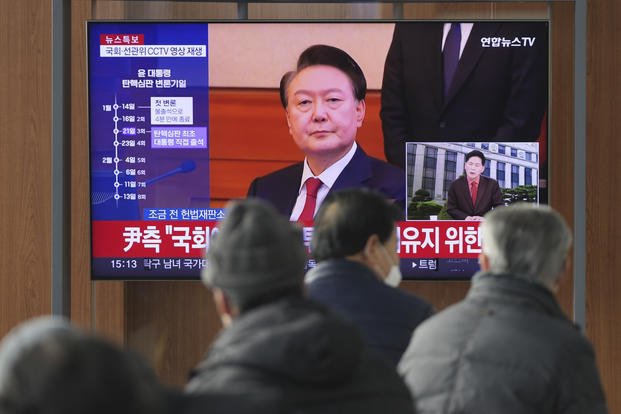

SEOUL, South Korea — South Korean investigators asked prosecutors to indict the country’s detained President Yoon Suk Yeol over his short-lived imposition of martial law last month, as it accused him of rebellion, abuse of power and obstruction of parliament on Thursday.
Yoon defended his actions again as he appeared at a court hearing for the second time Thursday, saying the Dec. 3 martial law decree was only meant to inform the public of the danger of an opposition-controlled National Assembly. He argued that the martial law imposition ended early because he quickly withdrew troops after the assembly voted down his decree.
“The reason for the declaration of martial law wasn’t about a warning to the opposition. I was trying to appeal to the people to draw their strict supervision and criticism of the opposition,” Yoon told a hearing at the Constitutional Court. “No matter how many warnings I would issue to the opposition, they would have been useless.”
Yoon was impeached and suspended by the assembly on Dec. 14. The Constitutional Court is now deliberating to determine whether to formally throw Yoon out of office or reinstate him.
Appearing at the same hearing, Yoon’s defense minister at the time of the martial law enforcement, Kim Yong Hyun, supported the president’s argument, saying that he drew up the decree and proposed it to Yoon.
Kim, a close associate of Yoon who is also in detention, claimed that Yoon asked him to remove a public curfew from the decree, deploy a much smaller number of soldiers to the assembly than he initially proposed, and prevent troops from carrying live ammunition.
Kim’s arguments couldn’t immediately be independently verified. He has previously said all responsibility for the imposition of martial law rests solely with him. He was stopped from attempting suicide while in detention, days after the ill-fated martial law enactment.
Since taking office in 2022, Yoon, a conservative, has grappled with near-constant frictions with the main liberal opposition Democratic Party, which has obstructed his agenda and impeached some of his top officials. In his announcement of martial law, Yoon called the assembly “a den of criminals” that was bogging down government affairs, and vowed to eliminate “shameless North Korea followers and anti-state forces.”
Yoon’s martial law, the first of its kind in South Korea for more than 40 years, lasted only six hours. Yoon sent troops and police officers to the National Assembly, but enough lawmakers managed to enter the assembly chamber and called for an end to the emergency decree in a unanimous vote.
Yoon and Kim have said that his dispatch of troops and police forces was designed to maintain order. But the opposition and investigative authorities believe they tried to seal the assembly to prevent lawmakers from overturning his decree and plotted to detain some politicians. Yoon and Kim denied that.
Earlier Thursday, the Corruption Investigation Office for High-Ranking Officials said that Yoon, in collaboration with Kim and other military commanders, allegedly committed rebellion by staging a “riot” and seeking to undermine the constitution when he declared martial law. The CIO also accused Yoon of abusing his power by mobilizing troops for an illegitimate purpose and obstructing parliament’s right to vote on ending martial law.
By law, the leader of a rebellion can face life in prison or the death penalty. Since being detained by the CIO, Yoon has rebuffed efforts to question him. He argues that the investigation and his detention are illegal.
“As you know, despite facing a nationally grave allegation as ringleader of a rebellion, the suspect has been constantly maintaining uncooperative stance and defying criminal judicial proceedings,” Lee Jae-seung, deputy chief prosecutor at the CIO, told a televised briefing.
Yoon’s defense team issued a statement accusing the CIO of “humiliating” Yoon by trying to pressure him to speak to investigators and abusing his human rights by preventing him from contacting family members.
In his first appearance at a Constitutional Court hearing on Tuesday, Yoon denied that he ordered the military to drag lawmakers out of the National Assembly to prevent them from voting. Commanders of military units that were sent to the assembly have testified that Yoon ordered them to pull lawmakers out.
Yoon’s martial law decree has shaken South Korean politics and financial markets and hurt its international image. Yoon’s subsequent defiance and the opposition’s push to oust him have also intensified South Korea’s already-serious internal divide.
© Copyright 2025 Associated Press. All rights reserved. This material may not be published, broadcast, rewritten or redistributed.
